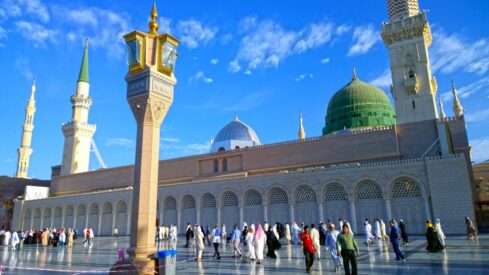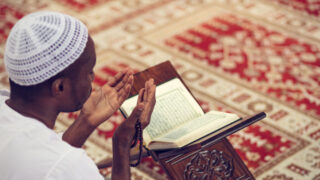A lot of Muslims may be wondering about the Prophet’s life in Ramadan. How did he fast? How did he take his suhoor? How did he break his fast? How did he spend the day while fasting?
The Prophet (may the peace and blessing of Allah be upon him) would intend fasting every day and have suhoor with one of his wives. He would eat a little, sometimes with a few dates as his suhoor or a little food and some water. He sometimes took suhoor with some of his companions. It was narrated in an authentic Hadith that he took his suhoor with Zaid ibn Harithah.
After Suhoor, the Prophet (may the peace and blessing of Allah be upon him) would observe his prayer. The interval between his suhoor and prayer was no more than the length of time it takes a man to recite fifty verses from the Qur’an. At other times, the prophet may offer two light Subh supererogatory prayer and wait in his house till Bilãl seeks his permission for iqãmat. The prophet would then come out through his wives’ rooms because they were attached to the masjid. He would then observe Subh prayer with the people.
After prayer, the Prophet would stay back until sunrise, remembering Allah. He would wait for about twenty minutes or more and subsequently offer two raka’at. He is reported to have said that whoever does so will have the reward of one who performed Hajj and ‘Umrah with full rewards.
The Prophet (may the peace and blessing of Allah be upon him) used to be at the service of his household. He was nice and played with them even in Ramadan. He would kiss some of his wives while fasting, but this is exclusive to the Prophet (may the peace and blessing of Allah be upon him).
When magrib approaches, he would utter the evening supplications and some prayers, and when the adhan for magrib was called, he’d request for breaking the fast. He would break his fast with fresh date fruits before observing magrib, if there were no fresh date fruits, he would eat three dry dates, and if there were no dry datefruits, he would take three draughts of water.Anas (May Allah be pleased with him) reported:
The Messenger of Allah (may the peace and blessing of Allah be upon him) used to break his Saum (fasting) before performing Maghrib prayer with three fresh date-fruits; if there were no fresh date- fruits, he will eat three dry dates; and if there were no dry date- fruits; he would take three draughts of water.
The prophet used to observe his magrib prayer after breaking his fast (may the peace and blessing of Allah be upon him) then return home to offer the post-magrib supererogatory prayer. He’d sit with his wives until the adhan for ‘isha’ prayer is called, observe pre-isha’ supererogatory prayer in his house, then go out to lead people in ‘isha prayer
The prophet had led the companions in tarawih three times, after which he did not come out to them for fear of it being mandatory upon them. He then returned home and prayed in the mid night as much as Allah enabled him. He used to prolong the prayer.
Aishah (May Allah be pleased with her) reported:
The Messenger of Allah (may the peace and blessing of Allah be upon him) did not observe more than eleven Rak’ah (of Tahajjud prayers), be it in Ramadan or any other month. Firstly, he would perform four Rak’ah. Ask not about their excellence and their length. He (may the peace and blessing of Allah be upon him) would then perform four more Rak’ah; and do not ask about their excellence and their length. Then he would perform three Rak’ah.
When he completes his prayer, he would sleep before observing witr, and ‘Aisha asked: O Messenger of Allah! Do you sleep before performing the Witr prayer?” He (may the peace and blessing of Allah be upon him) said, “O ‘Aishah! My eyes sleep but my heart does not sleep. And that’s because, it is from the Sunnah that one observes witr before he sleeps. But this is exclusive to the prophet (may the peace and blessing of Allah be upon him).
It is also from his habit that when he had sexual intercourse with his wife in the night of Ramadan, he would sleep and not wake up until fajr prayer. Afterwards, he would wake up with janabaah (major impurity) to perform the ghusl (ritual bath) and then go to observe fajr prayer.
He (may the peace and blessing of Allah be upon him) teaches the Muslims that fasting only takes place in the day of Ramadan not the night, as well as abstinence from the lawful things.
He (may the peace and blessing of Allah be upon him) used to occupy himself in Ramadan with recitation of the Qur’an, prayer, supplication, charity and fasting. He does eat a little and may go on fasting for two or three days saying, I spend the night while my Lord provides me with food and drink.
Among the things that characterized the life of the Prophet in Ramadan is that, he serves as a good example for holding hunger, while teaching his ummah (Muslims) that Ramadan is not the month of eating, drinking and playing as it is the case in many Muslim homes. Rather, he exemplifies that Ramadan is a month of worship and obedience to Allah, the exalted.
The prophet (may the peace and blessing of Allah be upon him) used to pray tarawih in his house for fear of it being mandatory. However, when it was the last days of Ramadan he gathered his daughters, wives and the believers for prayer in congregation. He used to pray at night, stay with his family, then eat suhoor and wait for the fajr prayer, he would observe fajr supererogatory prayer, then go out for the fajr obligatory prayer in congregation.
He (may the peace and blessing of Allah be upon him) used to give out alms to the poor and needy and increase the alms in Ramadan over other months until the companions described his way of giving in Ramadan as “blowing wind”. This is because of the way he gives alms and his hastening to console the poor and needy in the month.
The prophet (may the peace and blessing of Allah be upon him) used to seclude himself in the mosque during the last ten days of Ramadan but, he observed seclusion for twenty days in his last Ramadan. He used to strive in worshipping in these last ten days, seeking the night of power as was reported from him: look out for the night of power during the last ten days of Ramadan. Also he said to his companions: “I see that your dreams have coincided with each other upon the last ten nights. So, whosoever seeks it, let him seek it in the last ten nights. Among the major characteristics of the life of the Prophet in Ramadan is that he loved to be more prayerful in it as it was report by At-Tirmidhi from Aisha, may Allah be pleased with her, who said: I said: O Messenger of God, if I knew which night is the Night of Power, what should I say about it? He said: “Say: O God, you are the Generous at pardoning, and you love to pardon, so pardon me. He also used to wake his family to strive in worshipping in the last ten days and never left them sleeping as it was reported by At-Tirmidhi with his chain, from Aliy ibn Abi Talib that the prophet, may the peace and blessings of Allah be upon him used to wake his family in the last ten days of Ramadan.
The prophet, may the peace and blessing of Allah be upon him, serves as a role model for a husband to be keen in his family’s obedience to Allah, not on their food, drink, sleeping and worldly affairs alone, while neglecting their religion when Allah says: “O you who believe, save yourselves and your families from the Fire” At-Tahrim 6


















